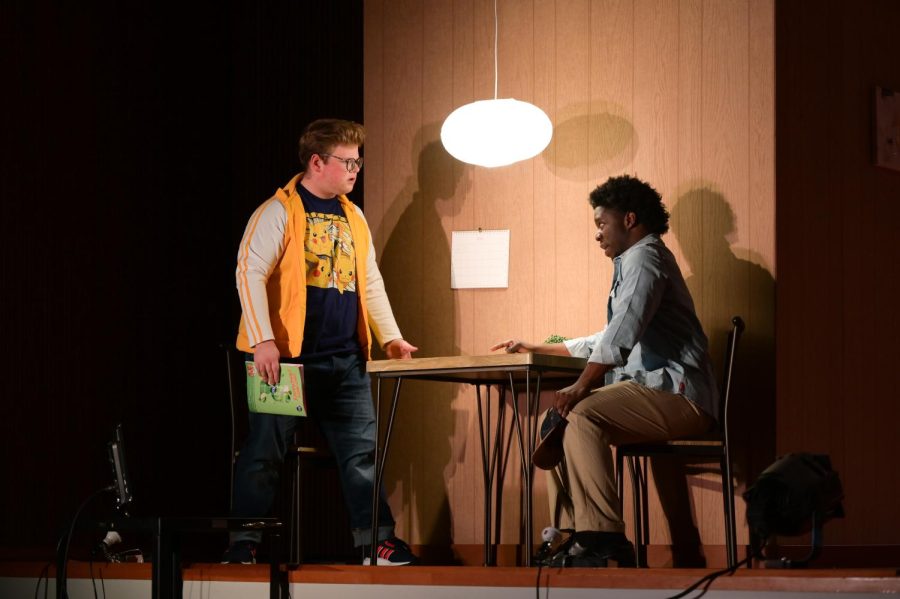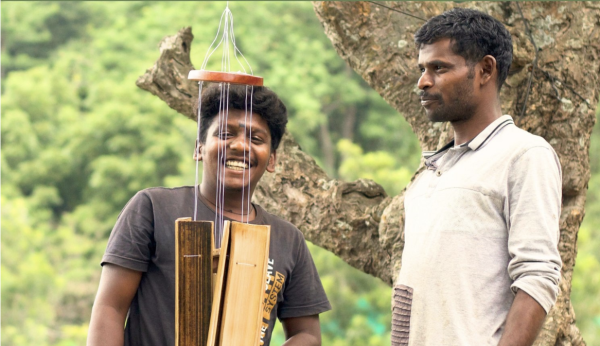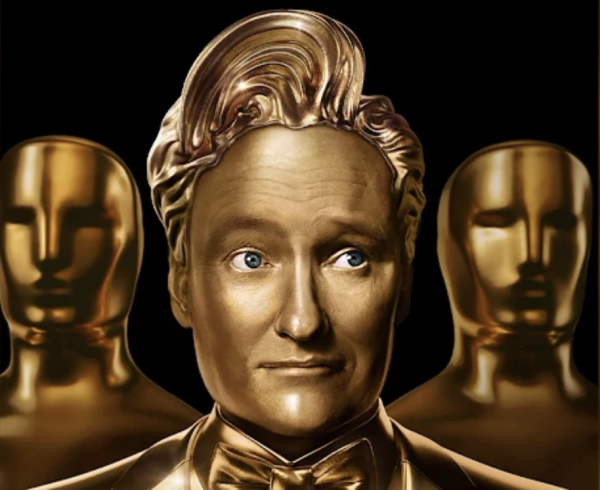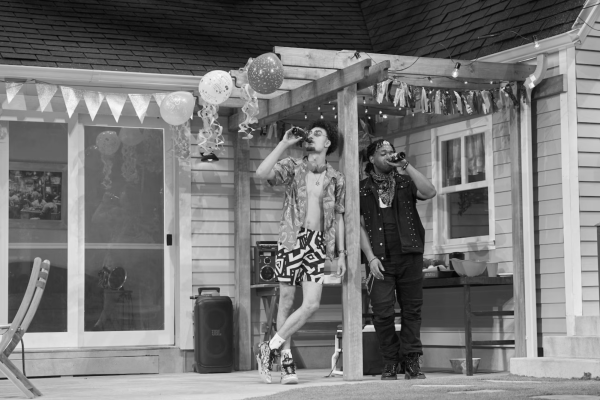The Puppy Episode Highlights ’90s Queer Experiences
On Feb. 16, this year’s Winter Term opera The Puppy Episode made its production debut in Warner Concert Hall. The show was composed by Matthew Recio with libretto by Royce Vavrek. The Puppy Episode remembers the titular episode from Ellen DeGeneres’ sitcom Ellen as a queer cultural milestone and recontextualizes queerness and coming out in the ’90s through the fictional stories of a variety of LGBTQ+ characters.
Commissioned by Chicago Opera Theater, Recio initially set out to write a chamber opera with queer characters, but it wasn’t until he teamed up with librettist Vavrek that the idea to write it about DeGeneres came about.
“I wasn’t necessarily interested in writing an opera about her, but then when Royce described what it was, I was like, ‘Actually I think that’s very compelling,’” Recio said. “I think a lot of people forget about that time that she came out and what that meant for media and what that meant for the queer community.”
DeGeneres’ character on the show, Ellen Morgan, came out as a lesbian almost 25 years ago on April 30, 1997, in a two-part Ellen episode strategically called “The Puppy Episode” to keep its intentions a secret. The episode sent shockwaves across the U.S., receiving acclaim and backlash for its queer representation. Sixteen days earlier, Ellen DeGeneres herself came out to the world with her iconic Time magazine cover, announcing, “Yep, I’m Gay.”
Although the opera involves these true events — and even features an Ellen-esque character, Comedian, played by Conservatory second-year Elizabeth Hanje — The Puppy Episode’s complex storyline focuses more on the experiences of four gay characters living in a pre-“Puppy Episode” world. Friends Gil and Clay, played by Conservatory first-year Chris Leimgruber and Conservatory third-year Jon Motes respectively, struggle to confess their love for each other as two teenage boys growing up in a hypermasculine, homophobic society. Phyllis, played by Conservatory fourth-year Jaclyn Hopping, is an elderly woman with dementia living in an assisted living facility; she confuses her nurse for her past love interest, Dot, played by Conservatory third-year Callie Iliff. Iliff also plays Louise, a closeted lesbian who comes out to her husband of 15 years, Joe, played by Conservatory fourth-year Anthony D. Anderson who also plays Gil’s Father and Man in Houndstooth.
According to Assistant Professor of Opera Theater and Director Christopher Mirto, one of the many strengths of The Puppy Episode is its ability to showcase a diverse cast of queer characters.
“The hope was always to find space in the Winter Term opera for underrepresented voices or for diverse voices.” Mirto said. “I was the most struck to put gay characters on stage. As a gay man it felt really exciting to be able to be part of a show that was of a moment that I lived through. … It was really great to give this show to a generation of people who both lived through it and a generation of people who — thankfully — don’t actually have to live through that right now.”
Motes echoed that, for younger generations, The Puppy Episode serves as a reminder of the reality of queer individuals born before the 21st century.
“We watched the episode, we watched these interviews that she did, [and] listening to people talk about how they don’t want their children to be affected by watching two women kiss — it’s shocking these days to think that that’s just over 20 years ago,” he said.
For Iliff, who identifies as queer but grew up in a solidly post-“Puppy Episode” era, the nuanced portrayal of the characters made the show intriguing.
“I was drawn to the complexity of each character,” Iliff said. “It’s a quiet power that each character has, and that’s the kind of power that we all have. I think that’s why it’s so universal. I knew that people would love it and feel seen. And that’s the whole point of pieces like this — to just help people feel seen and help people feel things that are a little bit uncomfortable or unfamiliar to them or something that they didn’t realize about themselves.”
As an opera, The Puppy Episode is also unique in its setting and tone. For the story to feel close enough to be relatable, Recio wrote the opera for be more accessible for its performers, who mostly come from classical training backgrounds.
“Because this story is so much about … relationships and connection and love and discovering oneself, I wanted it to feel intimate,” Recio said. “So I made sure that the language was very open, very lyrical; that allowed the performer to emote, that gave a lot of room for them to express.”
As a performer, Anderson could feel the distinctly contemporary nature of the writing.
“One of the strange things about this is I think it has some elements of musical theater,” he said. “It being a period piece, you know, it’s a lot more nuanced to the 1990s instead of something [from] the 1700–1800s. So instead of in grand opera where a lot of the gestures are huge, grandiose, … I was told a lot of the time to tone down a lot of my gestures — make it more regular or more human, more common.”
Hanje agreed, noting that this show was distinct from her previous experiences with opera performance.
“Even though there are flowing lines in this opera, there’s also a lot of not-flowing lines because we try to make it as conversational as possible, and nobody speaks in a melody, you know?” she said. “Something I love about opera is the dramatism of it. This is not necessarily a true story, but it could be a true story, so you do not wanna dramatize it; you want it to be relatable. So just remembering that even though you’re acting, you are a human being telling someone else’s story, and that is the way you’re gonna touch people’s hearts.”
Another key feature of The Puppy Episode is that its actors play more than one character. That was an intentional choice made by Vavrek and Recio; both Iliff and Anderson played multiple roles, which required a more detail-oriented, hands-on approach. Iliff chose to embrace the overlap of her two characters and play up the ambiguity.
“My process was just seeing [Louise and Dot] as two completely separate people, but fully realized people, or else it wouldn’t be convincing,” she said. “And I really tried to see the similarities mostly because that’s what made it kind of confusing and beautiful to the audience members because they were so similar and so many lines were blurred between them.”
Although the Oberlin performances have concluded, The Puppy Episode in its original glory — with the same cast and crew members — will have its professional debut with Opera Columbus’ “40 Days of Opera” series in May.
“I’m so excited for them to have their professional debut,” Recio said about the students in the performance. “I think they’ve really invested [in it] and made it something beautiful, and I think people are gonna really notice those singers and I’m excited for that.”
Iliff noted the unique opportunity to present a diverse array of voices and experiences in modern opera to a larger audience.
“We need to be making stories like this, which are adjusted to the world that we live in now,” she said. “There’s something so magical about classical opera — like early, ‘normal’ opera — that we can see ourselves in and also see a world from the past, but stories like The Puppy Episode need to be told now because we can actually see ourselves in it.”











